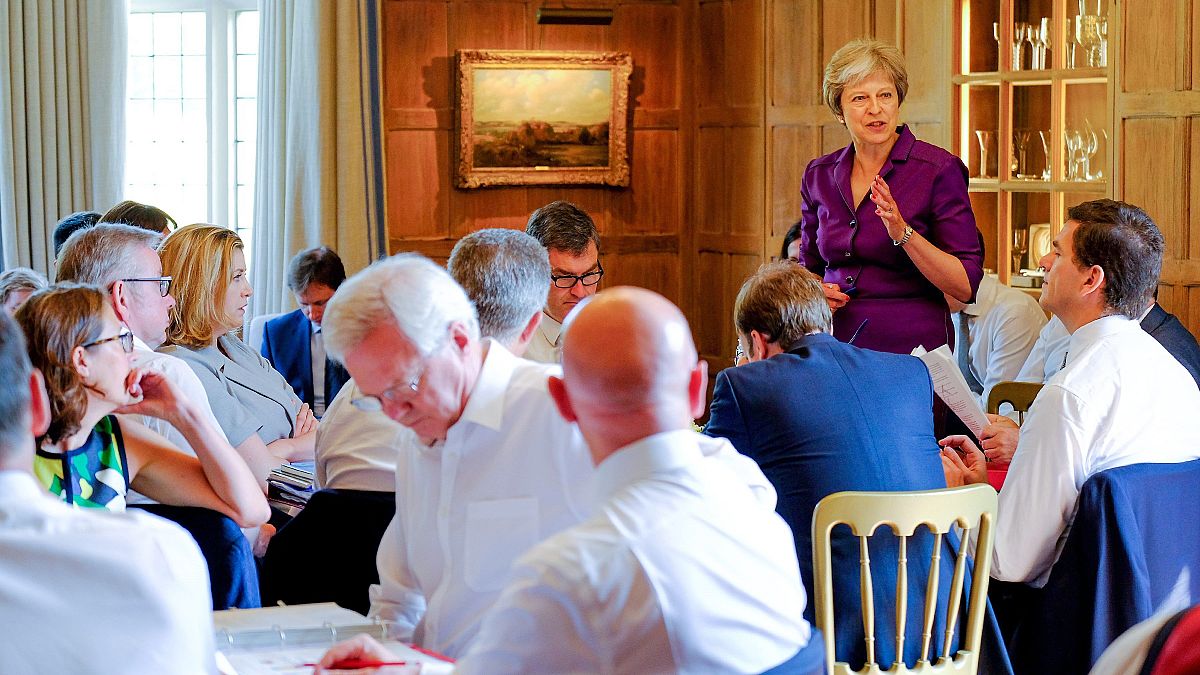The "business-friendly" proposal for a future free-trade deal with the European Union is aimed at spurring stalled Brexit talks.
LONDON — British Prime Minister Theresa May corralled her Cabinet inside an English country house for a long, hot day Friday, and announced that the divided government had finally agreed on a plan for a future free-trade deal with the European Union.
The proposal aims to keep the U.K. and the bloc in a free-trade zone for goods, but not for services, which make up the bulk of the British economy.
After almost 12 hours of talks at Chequers, the prime minister's country retreat, May said that "the Cabinet has agreed our collective position for the future of our negotiations with the E.U." — a pronouncement akin to the British government equivalent of white smoke from the Vatican announcing the election of a new pope.
But getting the Conservative government to agree with itself may be the easy part.
World
As ministers met behind closed doors — and without their phones, to prevent snooping and leaks — the E.U.'s chief negotiator, Michel Barnier, warned the bloc would not accept anything that treated the union's single market, which allows the free flow of goods and services, as a "big supermarket."
After the British statement, Barnier tweeted that the E.U. would "assess proposals to see if they are workable & realistic."
At first glance the British proposals sit uneasily with repeated E.U. warnings that the U.K cannot "cherry pick" the benefits of E.U. membership, such as access to the tariff-free customs union and single market, without accepting the responsibilities, which include allowing the free movement of E.U. citizens to the U.K.
The U.K. is firm that it will end free movement, as well as the jurisdiction of the E.U.'s top court in British affairs.
In a tacit acknowledgement that Brussels may not like the proposals, the British government also said it would step up preparations for a "no deal" Brexit — though it said it strongly favored an agreement.
Friday's meeting at the 16th-century manor house 40 miles northwest of London came with just nine months to go until the U.K. leaves the bloc, and with the E.U. warning that time is running out to seal a divorce deal.
Currently Britain is part of the E.U.'s single market — which allows for the frictionless flow of goods and services among the 28 member states — and its tariff-free customs union for goods. That will end after Brexit, but what will replace it remains unclear.
Ever since Britain voted to leave the E.U. two years ago, its government has been divided between Brexit-backing ministers who want a sharp break from the bloc so the U.K. can strike new trade deals around the world, and a more pro-E.U. group that wants to avoid tariffs and other friction between the U.K. and its biggest trading partner.
That view has been echoed by big manufacturers, including Airbus and Jaguar Land Rover, who warn they could abandon Britain if the E.U. and the U.K. cannot strike a strong free trade deal.
World
Leading pro-Brexit Cabinet ministers, including Foreign Secretary Boris Johnson and Brexit Secretary David Davis, met in private on the eve of Friday's meeting, sparking rumors some could quit rather than agree to May's proposal.
For now, though, May appears to have united the pro-Brexit and pro-E.U. wings of her government behind a compromise, which will be published in detail next week.
Written off by critics regularly since losing her Conservative Party's parliamentary majority in an ill-judged election last year, she will be buoyed by the hard-won agreement.
Initial business reaction was positive. Carolyn Fairbairn, head of the Confederation of British Industry, said the agreement was "a genuine confidence boost."
But arch-euroskeptics accused the government of a betraying Brexit. Former U.K. Independence Party leader Nigel Farage said the proposal was "a sell-out to the global corporates."
